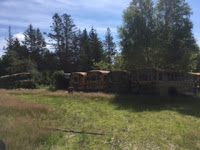It had not been there long enough to be collected.
The shell's beauty, as it becomes lace-like, is the result, most frequently, of being riddled by the sharpened tongues of tiny carnivorous sea snails.
It reminds me of one of my favorite quotes from Maurice Sendak's "Where the Wild Things Are:" [link is to a wonderful 1966 essay by the inimitable Nat Hentoff]
“But the wild things cried, “Oh please don’t go - we’ll eat you up - we love you so!”
The world does eat us up as it keeps us with it. Life riddles us with mysteries (carnivorous sea snail?!), pains, and pleasures that leave our faces pitted, our knees scarred, our backs twisted, our hands gnarled.
We are lucky to be consumed by the world that loves us so.
And yet: consumption is not always pleasant. We endure great suffering as we are gnashed within the teeth of this world, some more than others.
I found this shell on Third Beach in Middletown, RI, where I am for the week supporting a dear friend who, 12 years ago at age 48, was diagnosed with early onset Parkinson's.
Hers is a particularly virulent form of the disease inherent to her genetic roots in the Portuguese Azores. This goes far beyond the trembling (known as dyskinesia) you can see in Katharine Hepburn's later movies. It involves a separate but related disease, known as dystonia: painful, prolonged muscle contractions that cause abnormal movements and postures and physical damage. In my friend's case, the dystonia has been breaking bones in her spine and neck, resulting in two surgeries in each area, all only somewhat successful.
My friend is a brilliant and engaged doctor of economics. The world loves her so it is eating her up, bite by bite, each bite all too apparent to the rest of us who also love her.
Life riddles us with mysteries and holes. Why her and not me? Why do our bodies fail in such painful ways? While death is an essential part of our natures, some of the routes we take to arrive there seem unnecessarily excruciating.
And then again, perhaps not. Perhaps in all our various sufferings and pains, all of the violence and anguish, the replaced joints and cancers, the divorces and abandonments and cruelties we might understand, in our battered bones, how frail and imperfect, how vulnerable we as a species are.
We could be humbled in the face of this frailty, and in our humility we might focus on how to hold these soft, vulnerable bodies, hearts and souls, and the planet of which we are but a part, with care and kindness.
Instead in so many ways we double down, ferociously keeping death at bay with one hand while with the other wreaking the very havoc that increases our suffering: murdering, raping, and pillaging not only each other but the entire planet with toxins, trash, and tactics that brutalize it, drilling millions of tiny holes in the very atmosphere meant to protect us, in the water that is our life blood. Refusing to see how these poisonous habits are the source of so many of our cancers, so much of our suffering.
It's not about someone else "out there" or a god who is not in every one of us. It's about us.
Life riddles us. Our shells are filled with tiny holes, sometimes visible, sometimes not. And rather than exulting in the wondrous mystery of it all, we pull in our heads and pretend we are not just each a tiny organism dependent on the millions around us.






